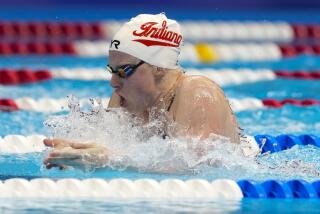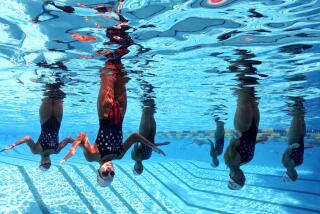Quance’s Medley May Include a Few Legal Strokes
- Share via
Kristine Quance’s Olympic-sized dream, when she was 11, had enough room for a white BMW convertible “with a tan interior.”
Back then, her parents promised the Northridge youngster a car if she ever made the Olympic swimming team. The family joked about it through the years, the titles and the low points. But Kristine never really took the promise seriously, and certainly didn’t plan on calling it in after she had made the U.S. team in the 100-meter breaststroke and 200 individual medley.
But David and Sandy Quance surprised her.
“They said, ‘You can get a car or a lawyer. It’s your choice,’ ” Kristine Quance said, laughing.
“Obviously, I took the lawyer.”
It was a choice Quance hardly could have anticipated. Her disqualification from her signature race, the 400 individual medley, at the Olympic trials in March for an improper turn was considered not only controversial but unprecedented. According to many who follow swimming closely, a swimmer making an improper turn usually draws a warning, not a disqualification.
And with the Olympics fast approaching, the controversy has accelerated as Quance and her family seek to get the disqualification overturned. They have retained a Colorado Springs attorney, Lance Sears, and asked U.S. Swimming, the national governing body, for an investigation.
Sears’ initial step was to contact Ray Essick, executive director of U.S. Swimming.
Said Charlie Snyder, U.S. Swimming’s communications director, “The last I heard was what [Essick] said then, that he would bring the matter up with the president of U.S. Swimming [Carol Zaleski] and legal counsel [Rich Young] to decide whether a national board of review would be appointed.”
Some sort of movement is expected on the issue during the Speedo Invitational, starting Friday in Phoenix. The meet features the U.S. Olympians, and Quance will not only swim in the 100 breaststroke and 200 individual medley, she will compete in the 400 individual medley as well.
Quance, 21, who just finished her junior year at USC, has been able to keep her focus on swimming with the help of her family, Coach Mark Schubert and a family spokeswoman, Sonja Eddings Brown.
Quance can even handle the situation with a sense of humor, which she displayed frequently Tuesday in her first interview since the trials.
“We joke about it,” Quance said of the recent furor. “If you can’t laugh at it, then what can you do, cry the rest of your life? No.
“I don’t mind talking about it. The only thing I have a hard time doing is watching it.”
For her, the early days were the toughest.
“I think I went through a period--someone kind of compared it to a grieving period, when someone dies,” she said. “You have to go through it and get over it, whether I get to swim the 400 IM [in the Olympics] or not. I’m not pessimistic, but I feel I have nothing to lose. I’m already not swimming it.”
To reach that point took time. Even though Quance, oddly enough, qualified in her two weaker events, she found herself on an emotional see-saw.
On one hand, there was the excitement of being in in the Olympics. Mononucleosis before the trials weakened her and prevented her from making the team in 1992. But Quance kept thinking about not swimming in her best event, the one that offered her best chance for a gold medal
She began turning in inconsistent workouts and the normally hard worker even skipped a morning practice, without calling Schubert.
“He’d probably get mad at me for saying this,” Quance said, laughing, “but I will anyway. . . . I get this message from Mark and he doesn’t say anything but, ’92 more days.’ I went, ‘Oh my gosh, I think I should tell him I’m having a problem.’ We weren’t communicating.
“He was really understanding once I explained it. As soon as I told him, he said we need to do something about it.”
One step was seeing a psychologist for a single visit. The other was taking measures to explore legal options.
“We didn’t even know it would go anywhere,” Quance said. “We decided we don’t want to look back in a year, or 10, and say we wish we would have explored our options. We hadn’t thought about it until my parents had a lot of people tell them, ‘This is wrong, you need to look into it.’ ”
Several issues are likely to be explored if there is a review:
--Whether swimmers are customarily warned about minor infractions instead of disqualified.
--What rules were in force at the trials, national or international? Brown and Sears said the illegal turn Quance was disqualified for--the transition from backstroke to breaststroke--is not observed under international rules.
“No one has been disqualified for this in the trials that we know of,” Sears said. “There have been a number of warnings. Absolutely everyone involved agrees [the improper turn] slowed her down.”
When first told she was disqualified, Quance said, she had no idea why. She felt she had done nothing different and had been pleasantly surprised that the preliminary heat had gone so well.
“I usually like to play around in the 400 IM in the morning,” she said. “In the last lap of the freestyle, I was looking over at my coaches and they know I’m joking around. I smiled one time with one breath and the next time I stuck my tongue out. I like to keep it fun.”
The fun ended when Quance got out of the pool and chaos ensued.
That night, she attended the finals and watched Allison Wagner and Whitney Metzler qualify for the Olympics.
“I started bawling,” Quance said. “I realized it was over. They had swam and I wasn’t in the water. Everything stood still and I didn’t know what to do or think.
“It’d be a great plus [now] if I could swim it. I’m not getting my hopes up because I don’t want to be let down and have to go through that all again. I don’t have enough time.”
More to Read
Go beyond the scoreboard
Get the latest on L.A.'s teams in the daily Sports Report newsletter.
You may occasionally receive promotional content from the Los Angeles Times.







